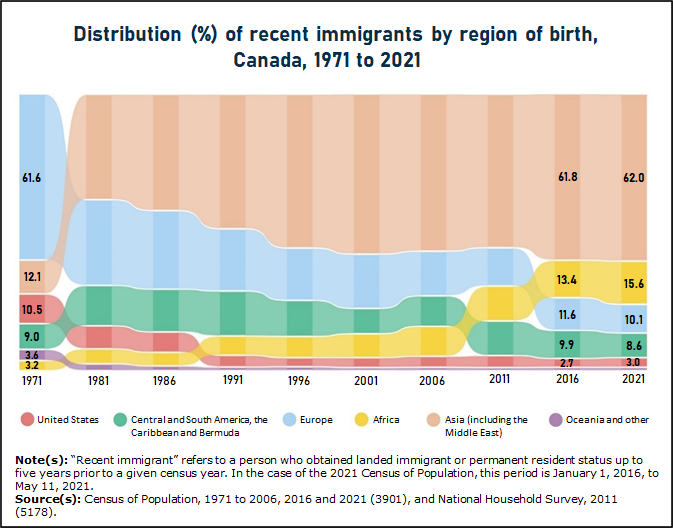17.3 The Benefits of Diversity
“In the face of complex global challenges, Canada will continue to champion diversity, acceptance and compassion on the world stage. We cannot build a better world unless we work together, respect our differences, protect the vulnerable, and put people at the heart of the decisions we make.”
– Rt. Hon. Justin Trudeau, Prime Minister of Canada (Government of Canada, 2022)
As you begin to explore how you are different than others in a respectful way, you begin to understand why you think and behave in certain ways based on your upbringing and past experiences and appreciate that this does not have to be the only way to approach life. Experiencing new ways of thinking, ideas, concepts and values leads to deeper and more novel and adaptive thinking and creative problem solving.

Diversity on campus is beneficial for all students, not just those from ethnic or minority groups. The wider perspectives of students from different backgrounds and the greater variety of teaching methods help everyone gain more fully in educational experiences. Socially, students develop a more mature worldview and are better prepared for interacting with a diverse world in the future.
In addition, students who embrace opportunities to experience diversity have greater satisfaction with their college careers and take a personal responsibility both for broadening their own social world and for speaking out against prejudice and discrimination wherever encountered.
The goal of many college admissions departments is to attract diverse students from a broad range of backgrounds involving different cultural, socioeconomic, age, and other factors—everything in the preceding list. But why is diversity so important?
- Experiencing diversity at college prepares students for the diversity they will encounter the rest of their lives. Learning to understand and accept people different from ourselves is very important in our world.
- Students learn better in a diverse educational setting. Encountering new concepts, values, and behaviours leads to thinking in deeper, more complex, and more creative ways, rather than furthering past ideas and attitudes.
- Diversity experiences help break the patterns of segregation and prejudice that have characterized
 North American history. Discrimination against others, whether by race, gender, age, sexual orientation, or anything else, is rooted in ignorance and sometimes fear of people who are different. Getting to know people who are different is the first step in accepting those differences.
North American history. Discrimination against others, whether by race, gender, age, sexual orientation, or anything else, is rooted in ignorance and sometimes fear of people who are different. Getting to know people who are different is the first step in accepting those differences. - Experiencing diversity makes us all better citizens in our democracy. When people can better understand and consider the ideas and perspectives of others, they are better equipped to participate meaningfully in our society.
- Diversity enhances self-awareness. We gain insights into our own thought processes, life experiences, and values as we learn from people whose backgrounds and experiences are different from our own.

Image Description
This is a ribbon chart that illustrates how the top regions of birth for recent immigrants have changed over the last 50 years (1971 to 2021). The regions are the United States; Central America, South America, the Caribbean and Bermuda; Europe; Africa; Asia (including the Middle East); and Oceania and others.The horizontal axis represents the following census years: 1971, 1981, 1986, 1991, 1996, 2001, 2006, 2011, 2016 and 2021. The left vertical axis details the proportion of recent immigrants in 1971 who were born in each source region. In 1971, 10.5% of recent immigrants were born in the United States; 9.0% were born in Central America, South America, the Caribbean and Bermuda; 61.6% were born in Europe; 3.2% were born in Africa; 12.1% were born in Asia (including the Middle East); and 3.6% were born in Oceania and others.
In 2016, 2.7% of recent immigrants were born in the United States; 9.9% were born in Central America, South America, the Caribbean and Bermuda; 11.6% were born in Europe; 13.4% were born in Africa; 61.8% were born in Asia (including the Middle East); and 0.7% were born in Oceania and others.
In 2021, 3.0% of recent immigrants were born in the United States; 8.6% were born in Central America, South America, the Caribbean and Bermuda; 10.1% were born in Europe; 15.6% were born in Africa; 62.0% were born in Asia (including the Middle East); and 0.7% were born in Oceania and others.
A Word About Multiculturalism
More than anything, multiculturalism is an attitude. Multiculturalism involves accepting and respecting the ideas, feelings, behaviours, and experiences of people different from oneself—all the forms of diversity described earlier. Canada is not actually a “melting pot” in the sense that people from diverse backgrounds somehow all become the same. Canada is often referred to as being a “mosaic” as it supports and preserves a great diversity of ideas, attitudes, and behaviours.
People of diverse religious backgrounds are not expected to “melt” together into one religion. Canada’s Charter of Rights and Freedoms guarantees the equal rights of all people regardless of skin colour, gender, age, and other differences—including, equality under the law for those with diverse sexual orientation.
“5.4 The Benefits of Diversity” from Fanshawe SOAR by Kristen Cavanagh is licensed under a Creative Commons Attribution-NonCommercial-ShareAlike 4.0 International License, except where otherwise noted.

